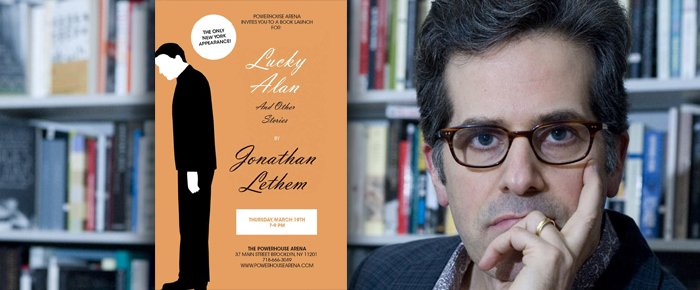
By Heidi Simmons
—–
Lucky Alan
By Jonathan Lethem
Stories
—–
It’s great to read an author whose writing is unencumbered and has nothing to worry about other than what’s on the page. In Jonathan Lethem’s Lucky Alan and Other Stories (Doubleday, 176 pages), nine stories reveal high craft and a story telling ability that goes beyond traditional and into the magical.
This is Lethem’s third collection of short stories. He has written nine novels, a novella, six non-fiction works, served as editor on several books and is a contributor to some of the finest literary periodicals the country has to offer. Certainly accomplished, he may be more fringe than mainstream since he writes not just for readers, but for writers.
The first story and book’s title “Lucky Alan” is told by a New York actor who connects and ultimately befriends an eccentric theater director named Sigismund Blondy.
Blondy shares a compelling story about an on and off again relationship with his friend and neighbor Alan Zwelish. Just an ordinary guy with a humdrum life, Alan becomes an unlikely part of Blondy’s life. Indifferent, the two have a contentious but honest friendship.
“Zwelish and his expectant young wife were more and more like figures in a snow globe viewable but uncontactable from the human realm.” Blondy confides that he cried when Alan died and that he had to move out of the apartment because he couldn’t take the gossip and felt like an outsider.
As the narrator takes in Blondy’s confession, he sees it as a love story. He wonders if any of the tale is true and if he is the new Lucky Alan. The third person voice adds an intriguing layer to this story.
In “King of the Sentence,” two booksellers who consider themselves literary experts and grammar snobs, seek to connect with their favorite American author. Wanting to share their favorite sentences with him, they stake out his PO Box and wait. When the opportunity arrives, the two encounter a regular guy who leaves them naked and alone. Told in first person, these characters come across as desperate and more than a little dangerous.
“Traveler Home” is about an outsider in a small woodsy community who finds himself rescuing a human baby from wolves and delivers the child to a family of beautiful but wild women. Lethem uses short present tense sentences here in staccato rapid fire that quickly engages the reader into the Traveler’s strange life.
“Procedure in Plein Air” is about a New Yorker who sees city workers dig a hole and then place a man inside. It’s some sort of punishment. The narrator feels it is his job to protect the man in the hole. And when he does, he learns a valuable lesson about human dignity. This story is a metaphor open for interpretation about society, the justice system and the treatment of criminals.
Comic book characters crash on a deserted island and form a new government in “Their Back Pages.” Here Lethem uses poems, sounds and journal entries from the various characters as if in panels of a comic book. It’s clever and fresh but different and quite bizarre story telling.
“The Porn Critic” tells the story of Kromer, a clerk at Sex Machines, who is responsible for reviewing all the store’s new porn videos. He is not a fan and it is not a dream job but there are perks. Kromer discovers he is not a porn sleaze ball but still an innocent in the ways of love and sex.
In “The Empty Room,” a young family moves to a big house in the country where the father insists on keeping a downstairs room empty. As the children grow up in the house, the room serves as a valuable space for entertainment and healing. This is my favorite in the collection. I like the way Lethem shows how quickly families grow and change.
“The Dreaming Jaw, The Salivating Ear” is about a blogger whose site has gotten out of control and the only way to stop the madness is to kill off a contributor identified as The Whom. The only way to regain entry to the blog is to rebuild better and stronger. In telling the story, Lethem uses blog entries that include different voices with some in text shorthand and all caps.
A father takes his kids to Sea World in “Pending Vegan.” Off his anti-anxiety drugs, he pushes his twin daughters around the park hoping he won’t have a complete break down. Using the first person voice of the father, Lethem charms the reader as the father tries to keep it together giving his children and wife a good time while envisioning his new self as a vegan.
With Lethem’s more imaginative stories, there may or may not be an allegory or metaphor embedded or intended. Although I’m always looking for layered meaning, I’m not sure the stories require it. Repeat readings may change that.
It’s exciting to read an author that reaches for new and interesting ways to convey ideas through narrative. Lethem has a love of language and the necessary skill to push the boundaries of contemporary literature. And clearly he has fun doing it.








































